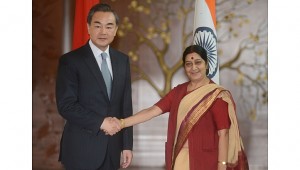India and China Bilateral Relationship Begins to Thaw
Tuesday, June 10th, 2014 12:05:21 by Khalil Khan
India and China, two neighboring countries faced by a deep mutual mistrust, seem to have begun the thawing of relations following the coming to power of the Indian Prime Minister Narendra Modi, the Hindu nationalist party. Indian Foreign Minister, Sushma Swaraj, and her Chinese counterpart, Wang Yi, met in New Delhi on Sunday in a meeting of the Executive Modi has described as “a productive start ” to the new relationship. Both countries have an interest to be fruitful talks: India wants to reduce a trade deficit of 40,000 million in its program to revive the national and China, immersed in territorial altercations marine economy south and east, seeks to stabilize ties to its west. Although the dispute between the two over the course of the common border of 3,400 kilometers between Beijing and New Delhi stands.
The two-day visit to New Delhi Wang, Monday will include a meeting with Modi, is the first high-level contact between the two countries since the inauguration of the Indian Prime Minister. China wants to “consolidate” the current ” friendship” between the two states ” and explore more cooperation,” according to Wang explained in an interview published Sunday that the Indian newspaper The Hindu.
The spokesman of Indian Affairs, Syed Akbaruddin, said in a press conference following the meeting between the two leaders that dialogue had been “productive and constructive.” “From our point of view, this is a productive start between the new government of India and China,” he added. Throughout this year there will be half a dozen ministerial visits or senior.
China has a strong interest in building bridges with the new Indian government. In fact, the Chinese premier, Li Keqiang, was the first to congratulate Modi after his victory. At stake are not only commercial but also strategic interests. Given the increasingly intense territorial disputes in the South China Sea and with Japan tone, Beijing needs at least a stable relationship with the rest of its neighbors. A closer ties between India and Japan, for example, would leave him in an awkward clip. India keeps an oil deal with Vietnam is also key in one of the flagship projects of Chinese foreign policy, ‘ Maritime Silk Road ‘ that raised Xi Jinping during his trip to Southeast Asia last fall.
That route seeks to increase the connection – and influence – from China to the Indian market through the development of ports and infrastructure in countries like Burma, Bangladesh, Sri Lanka and African nations. India ‘s support, or at least the neutrality of that country, and stability in the subcontinent are central to this strategy.
Short URL: https://www.newspakistan.pk/?p=45087

















